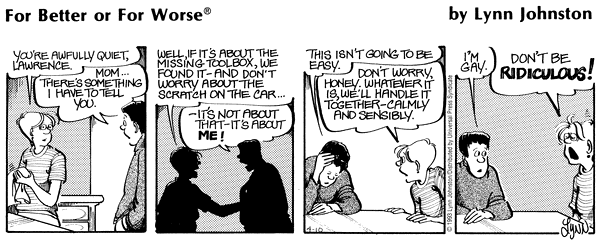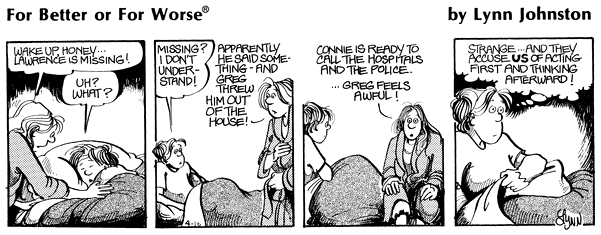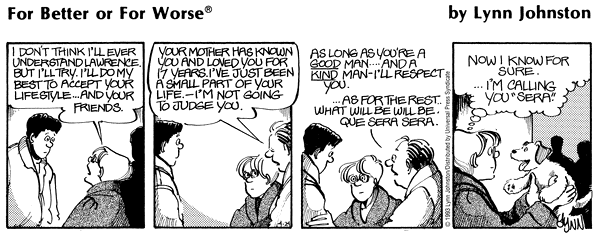JHB
JHB's JournalThey "surrendered" to it because all their success rides on a cushion of rabid foam
The policies of the Movement Conservatives who took over the party, and their wealthy backers/allies, aren't popular and couldn't get passed on their own merit. They want to restore the Gilded Age, where wealthy men had few if any impediments to doing whatever they wanted, and they liked the government they bought. They want to wipe out every law and policy put in place since the late 19th century that works for ordinary people.
How many votes would they get running on that?
Not many, so instead they promote rage and foam, but tried to keep it under control. Buckley gets a lot of credit for sidelining the Bircher leadership, but he and his crowd were hardly less extreme. They were just better at strategy. There was no hope of splitting, say, conservative Jewish voters away from the Democrats if the face of conservatism were people who reflexively spout anti-Semitic conspiracy theories.
They still encouraged bile and foam from the general public. In the 70s they used early forms of data mining to identify hot-button issues that could be used to split New Deal-era voting blocks, foremost among them abortion and guns.
By the 80s they were driving the Rockefeller Republicans, who they considered quislings, to political extinction. They'd gotten the numbers they needed to not bother compromising.
All through the late 70s, 80s, and 90s they encouraged axe-grinding and played footsie with RW crusades in order to get votes. Newt Gingich and Frank Luntz tested and compiled radicalizing language and promoted its use by Republican candidates.
They scare-mongered and scandal-mongered and played to all the bigotries and pet peeves, and called it "playing hardball". They wanted to get conservative Republicans elected, and there was no part of that job that involved "dialing it back." They painted Democrats as supervillains: utterly-corrupt, moral degenerates out to destroy the nation and all that's good and holy to get their voters all hot-blooded and into the voting booth.
Their entire success has been built on not compromising. The closest they come is when they act to blunt or stall actions by Democrats until Republicans are back in the driver's seat again.
But the drawback is: When you paint the story that way, it's supposed to end with you bringing the bad guys to justice. They rot in jail, or better yet get hanged or fried. Blow up the Death Star. Drop the Ring into the fires of Mount Doom. The Enemy surrenders unconditionally and their symbols get blown up.
They turned the Party of Lincoln into the Party of Salome. Salome is the base, and she grew increasingly pissed that the establishment Herods weren't bringing her the heads she'd asked for.
They turned the Party of Abe into the Party of Ahab. Ahab is the base, who if their chests were cannons they'd shoot their hearts out like cannonballs to trigger the libs.
They built a base that wants this:

But never gets it.
When you tell that story for decades, continually amping it up to keep the audience's blood at a rolling boil, you create an expectation that you can never really deliver on. You can justify decades of investigations and re-investigations and re-re-re-re-re-re-re-investigations, but that's not going turn up anything that will hold up in court. So you put yourself into the position of portraying the other side as unbearably evil and an active threat, and then don't do anything about it. The base still has their hot buttons pushed, still believes every word of it, they just start thinking you're ineffectual at best, or more likely are part of the problem.
Real "cancel culture": For Better Or For Worse, 1993
In one of my captions for today's TOON post, I repeat a question I've asked a lot lately: "Does anybody actually use 'woke' and 'cancel culture' anymore except right-wing assholes?" They're the new favorite chew toys, only partially at the expense of the quarter-century favorite, "political correctness."
They seem to just latch onto these things to vomit bile into, long after the original contexts and people who used them in those contexts have discarded them like worn-out underwear. They were useful at the time, but reasonable people move on.
In this frame of mind, while checking on non-political cartoons that are sometimes worth including, such as Non Sequitur and Pearls Before Swine, my eyes fell on Lynn Johnston's slice-of-family-life For Better Or For Worse (now ended but in perpetual reruns). And boy, did I remember a rock-solid example of "cancel culture" in action. Real cancel culture, the right-wing kind.
In 1993, she was contemplating why one of the regular supporting characters had drifted out of use, and getting a handle on the character (Lawrence, one of the neighbor kids and childhood friend to Patterson family's son Micheal) to better include him. As she put it, "After 'being' with him for some time, I realized the reason he was having so much trouble communicating with Michael and his friends was because Lawrence, now in his late teens, was different. Lawrence was gay."
So, she came up with a four-week story where he comes out to his friend, and his mother and step-dad.
And that was simply beyond the pale for some people.
From https://www.fborfw.com/features/lawrence/index.php
Within one week, nineteen papers had cancelled For Better or For Worse outright. Editors who decided to run the series were attacked for having the gall to do so. Those who chose not to run it were accused of "censorship." Editors and publishers were damned if they did, and damned if they didn't. They called the syndicate. Editors at Universal Press worked overtime, diffusing the anger, answering questions, calming, and reassuring these people who were being harassed, picketed, and were in the eye of a storm generated by ignorance. Those editors who wished to confront me personally were given my phone number. My phone rang constantly from 7 am to 10 pm every day. I answered all my calls. I spoke with everyone who needed to know why, what was I trying to do? Did I realize what I had done?
Editors, particularly from smaller communities, were in a most uncomfortable position. In rural areas, where everybody knows everyone else, they were singled out, their children were harassed at school. One editor confessed to me that his brother was gay. He was 100 percent supportive, but if anyone in his area knew that he was in favor of running the story, he would lose his job.
The "No" Mail
It was mostly from the United States that the sound was heard. Canadian papers carried the pro and con letters on the editorial pages. There were two cancellations and a few letters came to me, but by and large, it was a southern and very religious population that responded first and loudest and with a clenched, unyielding fist.
I cannot deny that it was upsetting. When 1,000 people organized to cancel their subscriptions to a Memphis paper, one editor's bitterness came through loud and clear. I had no right to "do this" to people. This subject was best left alone. I think the letter that hurt the most, was one of the first I received. It was from a woman who said she had loved my work for years but I was now no longer welcome in her home. She enclosed about a dozen yellowed strips she had kept on her refrigerator. That made me cry.
All of this, we called the "no" mail.
But also:






Our Funeral Home is Overwhelmed With Bodies
Caitlin Doughty is a Los Angeles-area funeral home owner and is host of the YouTube channel Caitlin Doughty – Ask A Mortician
She's fine with "big government" and thinks we need a lot more of certain kinds of it, really fast.
I don't think they're going to be able to afford a place on the Black Sea...
...but I'm sure Vlad will let them set up shop in a suitable location.

(Severny Island, above the Arctic Circle. Site of the biggest bomb in human history. It doesn't get more suitable for a Trump than that.)
HRC: Today, domestic terrorists attacked a foundation of our democracy
https://twitter.com/HillaryClinton/status/1346947444664369152Hillary Clinton
@HillaryClinton
Today, domestic terrorists attacked a foundation of our democracy: the peaceful transfer of power following free elections.
We must reestablish the rule of law and hold them accountable.
Democracy is fragile. Our leaders must live up to their responsibility to protect it.
You might want to check out this Twitter thread by a new DNC member
His observation of how things work and what the DNC can and can't do.
Unspooled for DU convenience
https://threadreaderapp.com/thread/1338951001726808064.html
So...as a newly elected DNC member, I'd like to provide some insight on "the DNC" to folks who like to complain about "the DNC" and such.
Because "the DNC" doesn't work how most folks who talk about it think it does. It's both better--and far worse--than you think.
First off, "the DNC" doesn't work like a major corporation or government apparatus. It doesn't have branches or committees or sprawling structures of employees who answer to higher-ups. It doesn't have a board of directors making decisions every month. None of that. /2
The Democratic Party is made up of thousands of loosely affiliated groups connected by charters. To simplify, it mostly works like this: local clubs > county committees > state parties > national orgs.
These are all legally separate entities with wildly separate cultures. /3
To add to that, there are multiple national orgs! The DNC is the *weakest* of those orgs. It pales in comparison to the much more powerful and influential DCCC (elects House members) and DSCC (elects Senators), plus the DGA (governors) and DLCC (legislatures.) /4
In reality, the DNC doesn't actually *do* much of anything in most non-presidential years! It meets once a year. It has some window dressing councils and caucuses. It passes a few resolutions.
And the elected membership has basically NO REAL ROLE OR DIRECT INPUT. /5
Elected DNC members don't even have each other's contact info! There are few mechanisms to even provide input or request changes. Everything is opaque. And even if you could, there's not much the DNC actually *does*. The biggest change would be making the DNC *do* things. /6
Far from being this super powerful organization controlling everything, the DNC actually does very little and controls nothing outside of presidential years, at which point it serves as a locus for consultants to direct state primary structures and help the nominee. /7
The *real* power in the Democratic Party lies in the DCCC and DSCC, which work w/ State Party chairs to help with congressional races.
Some states are more democratic & open than others (CA is pretty good!), but even in CA most actual power is wielded unitarily by the Chair. /8
The most truly small-D "democratic" work happens at the County Committee level, where club presidents and local elected committee members recruit, endorse and organize for local "non-partisan" races. Above that? It's almost *entirely* consultant driven in a tight circle. /9
The sad reality is that it would be *better* if the DNC actually ran like its critics think it did: a big mega-conglomerate machine. It's not.
It's actually a money firehose run by shoestring staff, run entirely a handful of consultants and appointed fundraising honchos. /10
Most "DNC members" have no capacity to organize either within the DNC, and have no serious directives. We are supposed to help raise money and amplify the messaging from on high--which, again, is directed by a tiny crew of unelected consultants and appointeds. /11
The DCCC and DSCC are even more inaccessible. The DNC at least has the window dressing of high-level activists. The DCCC and DSCC are directly run by the Congressional Members themselves. There is no pathway to involvement.
And they functionally dictate to state parties. /12
The problems with doing things this way are obvious:
1) self-dealing by consultants
2) unwillingness to change
3) lack of personnel capacity to change!
4) fear of losing a tightly held circle of power
5) groupthink and path dependency
6) inability to confront new ideas
/13
The biggest issue is that assumption that the best primary candidate is the one who can raise the most money. We know this isn't true! We outraise GOPs 3-1 but lose.
But it's hard to teach old dogs new tricks--especially when they're paid consultants who like the money! /14
There is no ability for activists closer to the ground to tell DCCC, DSCC or DNC when they're being tone-deaf to local concerns. No ability to influence decisions. And DCCC/DSCC/DNC continue to meddle in primaries.
In part because there's no organizational structure for it! /15
It would ironically be better if the Dem Party *did* run like a big corporation. Big corporations get input from local division leaders who report up the chain and influence decision-making! Successful local leaders get promoted!
No such organizational capacity exists. /16
So you get a bunch of extremely talented local activists who help win elections, promote progressive values, and get elected to positions that functionally serve as window dressing for the real power players--and get paid nothing!!
Those folks usually burn out. /17
Occasionally they get connected and get a plum gig, in exchange for playing the game and staying quiet. But then the only people who can make a living in the game are the careerists and brown-nosers.
Everyone else burns out or works doing what they can unpaid for decades./18
For instance, in California in the entire Dem Party structure the only people who get paid are the State Chair and staff. Plus consultants and whatever affiliate orgs do.
No one else makes a dime. Not the state Exec Board. Not the Regional Directors. Not the County Chairs. /19
So you have national orgs raking in literally billions of dollars, working with shoestring staff most of the time, ramping up armies of part-time and mostly volunteer workers in election season, directed by unelected consultants making big bank. That's it. /20
For everyone with a conspiracy theory about "the DNC" this or that, please note that these organizations can barely manage a meeting--if they keep a lid on all the members. They couldn't organize a conspiracy if their lives depended on it. /21
And there are legions of talented activists with nowhere to go and nothing to do but organize however they can in their free time, unpaid, usually at the local level.
If they want to work in politics they have to pay the toll. And usually OUTSIDE of the party apparatus! /22
In short, if you want this to improve, ironically the political parties need to actually be bigger, more consolidated, more powerful, have more permanent employees and be more directly accountable.
Right now it's the worst of both worlds: too much $, too little structure. /23
And that doesn't even get into culture. For instance, both Biden and Obama have brands that are broadly "anti-partisan." Work with anything, "one america" and such.
But they also appoint and control the DNC, an explicitly partisan organization! This leads to problems. /24
The DNC needs to be bigger, more powerful, more active year-round, and much more explicitly partisan and strategic. It needs to meddle less in primaries. And it needs to have much more opportunity for talented activists to help make decisions.
Same goes for DCCC/DSCC. /end
Oh...and I should mention: doing things this way incentivizes pure careerism, which in turn incentivizes gerontocracy.
It is not accident the average age of a dem party leader is over 70 years old--20 years older than for the GOP.
Even though we're the party favored by youth.
Original beginning tweet:
https://twitter.com/DavidOAtkins/status/1338951001726808064
Has Trump offered to pay Raffensperger...
https://twitter.com/mr_electrico/status/1346133288574996480He passed in 2001, and he did take a swipe at Trump
This is from 1999, when Trump was dabbling with a candidacy in Ross Perot's Reform Party.

https://downtherabbitholemag.wordpress.com/2015/04/24/political-cartoons/
Profile Information
Gender: Do not displayCurrent location: Somewhere in the NYC metropolitan statistical area
Member since: 2001
Number of posts: 37,158
